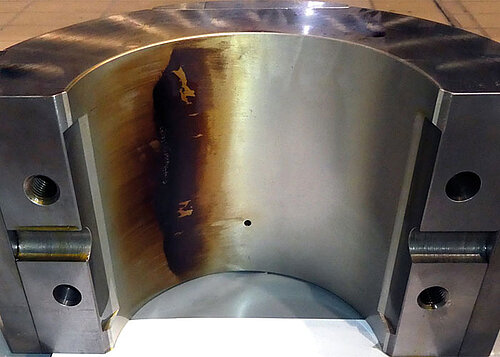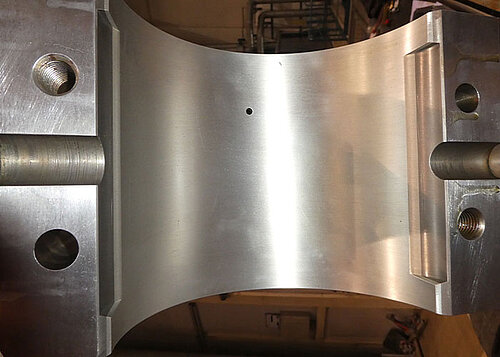How do they do this? With a wealth of know-how and pioneering processes, WESTO Varnish removes the hazardous reaction products of oil ageing and extends the service life of hydraulic and turbine oils many times over. It’s hard to be more any more cost-effective and sustainable than that!
Like all oils, hydraulic and turbine oils age over their service life. Atmospheric oxygen accumulates on the molecular chains consisting of hydrocarbons. The oils oxidise. To stop this process, antioxidants are added. However, over time they will degrade. At some stage, the point is reached at which oxidation and the associated degradation of the base oil are no longer adequately slowed down. Extremely high temperatures at certain points, e.g. on individual bearings with narrow bearing gaps, increasingly small oil volumes as well as possible contamination with dust, water and wear particles, also accelerate the ageing of the oil. Lubricant performance deteriorates. In addition, oil ageing usually also has resin or gel-like reaction products in its tow.
These are based on a combination of parts of spent antioxidants and degraded components of the base oil. If the oil can no longer hold these reaction products in solution, they change from a dissolved to a suspended state. They fail more frequently and agglomerate due to their polarity. At the same time, they bind foreign particles from very fine dirt, become larger and tend to settle. Metallic components, such as slide bearings, oil lines, oil coolers, tanks and gears, are the preferred targets for their deposits. Varnish is created with its orange-brown, lacquer-like coverings. These cannot be wiped off, but harden under the influence of temperature. In addition, the reaction products of oil ageing usually cause even more blocking of the filters and impair the function of valves. Expensive filter cartridges require more frequent replacement. Control valves with gaps of just a few µm can stick. Edge fractures on the valve pistons or jamming can occur and result in a malfunction of the control mechanism.
Varnish is persistent! Once it has a grip on a system, a simple oil change generally does not bring about any long-term improvement. Fresh oil has a higher solubility than used oil. It thus replaces existing coverings on flow-through surfaces. Caution must also be exercised when changing the oil in the control circuit! If a system is shut down, the oil temperature drops. The cooling often leads to an additional agglomeration of the oil degradation products in the control circuit and therefore to increased impairment of the functionality.


WESTO specialises in all matters of oil maintenance and has extensive expertise in the field of varnish removal. WESTO uses the ESP resin agglomeration process of FLUITEC and OELCHECK lubricant analyses.
The following report shows how varnish can be removed and how oil fillings in hydraulic systems and turbines can often be saved for years without replacement and for further use:
STADTWERKE MÜNCHEN: 8,500 L TURBINE OIL
VARNISH REMOVED AND SAVING TWO OIL CHANGES
2016 - SOS! The 8,500 l of turbine oil of an SWM (Stadtwerke München GmbH) steam turbine is suspected of being coated with varnish. This is generally visually evident from orange-brown deposits on the bottoms of tanks, valves and pipe bundles among other things, as well as from dark stripes in the tank at the oil level. In addition, increased foam formation often occurs.
WESTO first examines the abnormalities noticed by the SWM maintenance engineers as well as the history of the system and its oil filling schedule. An analysis of the turbine oil is commissioned straight away. Because at WESTO: Without an in-depth lubricant analysis from OELCHECK, it is not possible to either make a statement about the condition of the oil or the system, nor a decision about any service measures.
In the case of the 8,500 l of turbine oil, an analysis also provides final clarity: once again, it proves that OELCHECK tribologists not only have a great deal of expertise, but also assess the samples in their entirety. The MPC (membrane patch colorimetry) test is the only procedure worldwide that can be used to quantify an oil's potential to form varnish. But in this exceptional case, the test does not provide alarming values. Nevertheless, the tribologists from OELCHECK still diagnose varnish! The antioxidants in the oil are largely consumed and other indicators have reached critical levels.
One thing is clear: even if the MPC test does not yet indicate an acute, increased risk of coating, problems with deposits are expected in the foreseeable future. The turbine oil has reached the end of its service life. Therefore, further steps should be considered at an early stage. Stadtwerke München assumes that an oil change will have to be carried out before the next major inspection in 2022. But WESTO recommends waiting and starts a rescue operation for the 8,500 l of turbine oil.
2017 - WESTO has been working closely with FLUITEC for years on the subject of post-additivation and already has Decon AO, a new development from the internationally active clean-tech company. A controlled 3% of the agent is added to the turbine oil of Stadtwerke München. And the promised effect soon sets in. The solubility of the oil has improved. The next major overhaul of the turbine is due in 2022. OELCHECK monitors the turbine oil with regular analyses. But will the 8,500 liters definitely last until the next revision?
2022 - The year a decision is made! It doesn't look good at first. Worryingly high temperatures are detected on the bearings of a pinion bearing. Do the 8,500 l of turbine oil now have to be finally replaced with fresh oil? During ongoing operation and even before the turbine overhaul, WESTO uses a filter system in the bypass flow that works in a completely differently way to the classic bypass filtration. Both suspended and dissolved deposits need to be eliminated from the oil in order to eliminate the risk of varnishing. No typical off-line filter system can handle this, as many of the particles are usually under 0.1 µm in size and are therefore too fine to be captured.
WESTO is convinced that only a cleaning that makes use of the FLUITEC ESP procedure can handle this task. It works by accumulating the oil reaction products on special resins and removes both suspended and dissolved oil reaction products, even at the operating temperature of the oil, i.e. during ongoing operations as well. In addition to the treatment of the turbine oil using the ESP process and mechanical cleaning of the pinion bearing, FLUITEC Decon AO is added again as a precaution in order to protect the oil from a recurrence of the tendency to form varnish. OELCHECK then meticulously examines the turbine oil. The result: All parameters leave nothing to be desired! The turbine oil is back in shape! – The bearings of the steam turbine are also inspected as part of the overhaul. They are clean and free of deposits. Only the cooler of the system needs to be chemically cleaned of stubborn deposits.
2023 - Seven years have now passed since the first anomalies in 2016. The 8,500 l of turbine oil are still in use. For safety reasons, the oil is now accompanied by an ESP system permanently installed in the secondary flow and regularly monitored by OELCHECK all-inclusive analyses. WESTO has achieved the goal of putting the varnish in its place and maintaining the performance of the oil fill twice. An oil change did not have to be carried out in either 2017 or 2022.
Stadtwerke München have thus saved 2 x 8,500 litres of fresh turbine oil as well as associated expenses for the disposal of used oils and maintenance! In addition, this naturally also means conservation of resources and less strain on the environment thanks to the avoidance of oil changes and the corresponding disposal of used oil. It’s hard to be any more cost-effective and sustainable than that!
Not sprinters that will soon run out of breath, but rather long-distance and endurance runners with a lot of mileage – that’s what WESTO creates from the hydraulic and turbine oils of its customers. From the start of a plant and the operating phase to the overhaul and subsequent recommissioning – WESTO accompanies the oils throughout the entire production cycle. WESTO knows that oils are an important factor in increasing the availability of production facilities.
The environment and WESTO customers benefit from the operation of long-distance and endurance runners:
Founded in 1971 as a repair company and spare parts supplier for hydraulic systems, WESTO is today the leader in all matters related to oil maintenance! In addition to providing services, the company also manufactures off-line filter systems and varnish treatment systems. Customers in Germany and neighbouring European countries are served from the company headquarters in Pulheim near Cologne. – WESTO has been working closely with FLUITEC and OELCHECK for years. FLUITEC is an innovative (clean) tech company composed of international experts. The company is dedicated to a cleaner world through Fill-For-Life lubricants. The partnership with OELCHECK, the market leader in lubricant and service product analyses, has been in place for almost 30 years. And without a well-founded lubricant analysis from OELCHECK, WESTO cannot make a decision related to any oil maintenance measures.
For further information: www.westo.de
